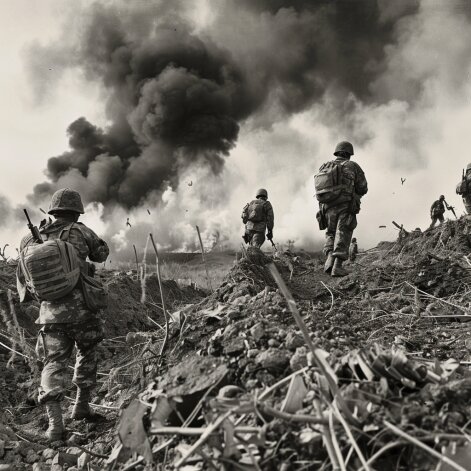Two years of war in Ukraine is already a long time, but recent events suggest that all forecasts regarding the end of hostilities no longer apply. For the first time, in speaking of a "long war" we're referring not only to Ukraine but also to other regions of the world: Gaza, Latin America, the Red Sea, Korea, Taiwan all face dimming prospects for a stable peace. War, like a pandemic, is gaining momentum, and it’s time to reflect on what went wrong over the last two years that led to a worsening of global security.
The Kremlin’s Corrections
After Putin's defeats in 2022, it seemed unbelievable that he could regain the initiative and the prospect of not being defeated. However, the Kremlin did serious work on its mistakes and learned lessons from its unsuccessful blitzkrieg. Two years of battle have shown Russian forces that their only advantage on the battlefield lies not in advanced weaponry or military art but in a ruthless attitude toward human life. Although the blitzkrieg failed, a creeping occupation, paid for in a large number of Russian lives, has produced results. This has become the new war strategy for the Russian dictator.
Putin and his team corrected many other mistakes. The Prigozhin incident forced them to take total control over any expression of freedom and dissent, and now the Kremlin's authority looks much more monolithic than at the beginning of the war. They also learned lessons from the battlefield, increasing the role of drones in combat operations. They managed to largely neutralize the pressure of sanctions and restructure the economy to handle the needs of a prolonged war. The solidarity and partnership of the "axis of evil," despite Putin's failures, only grew stronger, and they are preparing for new provocations against the West.
The West’s Errors
All this was possible because the Russian authorities carefully studied their mistakes. However, the same cannot be said about the West. Looking back at these two years of war, I've identified several systemic errors that require immediate correction for the restoration of global security and peace.
"This is Ukraine’s and Russia's war." A common mistake is to speak of the war as a conflict between Ukraine and Russia. But the truth is, this is a war for a new global order. Before invading Ukraine, Putin demanded that NATO stop expanding and return to its 1997 borders. Along with his allies, Iran and China, he proclaimed a multipolar world and demanded recognition of their right to capture sovereign states. It's crucial to explain in Western societies that Putin's victory means not just Ukraine's defeat but an invitation to more wars and threats worldwide.
"Putin can be negotiated with." The strategy to persuade Putin to abandon his plans has failed. Putin will not agree to any deal where he is not the winner. He has incurred significant human losses, which can only be justified by his victory. Therefore, the only way to stop him is to defeat him on the battlefield in Ukraine. The collapse of his cannibalistic strategy will finally corner him. This requires more weapons for Ukraine, more new technologies. After all, not only Putin is watching but also all those who want to revise the world order. The strength of Western weapons and the Armed Forces of Ukraine (AFU) is the best message to all to solve issues at the negotiation table, not on the battlefield.
"We should not provoke Putin by providing weapons." In reality, the spoon is dear when lunchtime is near. Since the beginning of the war, Ukraine has received mostly Western weapons. But the timing of these deliveries matters. Had Ukraine received F-16s in 2022, the outcome of the Ukrainian counteroffensive in 2023 would have been different. Russian aviation totally dominates the air, and this became one of the biggest problems of the military campaign in 2023. The timing of weapons deliveries varies in price, and this price is measured in the lives of Ukrainian warriors.
Wide-scale Problems in the West Provide Opportunities for Putin
There are many other issues that require attention. These include a lack of solidarity within NATO and the EU, undermined by Orban; the lack of efficacy of sanctions—Russia continues to access technologies and reap superprofits from oil sales; the inability of the world's leading economies to ramp up military-industrial production of equipment and ammunition. All this shows the West to be weak and threatens an increase in global tensions.
We must accept the fact that Putin has prepared for a long war. By our expectations, this spring he plans to launch a large-scale offensive on Kharkiv with 200,000 soldiers. His goal is not only to threaten the capture of the city of a million inhabitants but also to show the world that he leads jn the theater of military operations. This will allow him to mobilize additional support in other countries and attract new resources for waging war, and new opportunities to do so.
Ukrainians have repeatedly proved that they can restrain the Russian dictator and ruin his plans. However, unless Ukraine’s Western partners address the aforementioned deficiencies, this will be impossible. And the incredibly high price of thousands of Ukrainian warriors' lives will be devalued by Putin's successes. The world will plunge further into the darkness of new conflicts.
